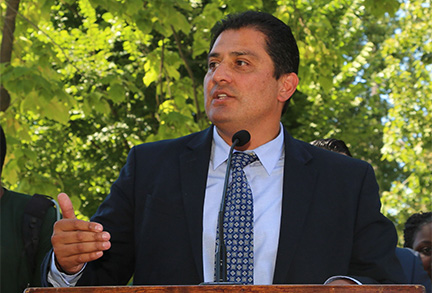Sacramento, CA – Governor Gavin Newsom has signed into law the Consumer Call Protection Act of 2019 (Senate Bill No. 208) by Senator Ben Hueso (D-San Diego). The law sets a deadline of January 1, 2021 for telecommunications providers to implement Caller ID authentication measures that can help identify illegal robocalls and prevent consumers from being scammed. The law also ensures that the California Public Utilities Commission (CPUC) can collaborate with the California Attorney General’s Office to support action against illegal robocallers.
“Fraud by robocallers is the number one consumer complaint in the country, and the volume of these calls has increased dramatically in recent years,” said Sen. Hueso, Chair of the Senate Energy, Utilities and Communications Committee. “The surge in illegal robocalls disproportionately impacts Californians, who receive the second highest number of robocalls in the nation. The State must take steps to ensure that its consumers can reliably answer their telephones without the fear of fraud.”
In 2017, Americans received over 30 billion robocalls, and experts estimate that between 30 and 40 percent of these calls were scams. The Federal Communications Commission (FCC) acknowledged that caller ID, or “neighbor”, spoofing is key to making robocall scams work. Neighbor spoofing occurs when a caller fakes a local phone number, tricking consumers into answering because they expect to speak with a local business, government office, family member, or friend. Instead, consumers usually receive a pre-recorded message attempting to scam the them. In addition to spoofing phone numbers that do not yet exist, scammers also spoof phone numbers of government agencies, utilities, and private individuals to conduct fraudulent activities.
A 2016 task force convened by the FCC suggested implementing a system that would ensure that callers are not spoofing numbers to circumvent caller identification systems. This system is known as the Secure Telephony Identity Revisited and Secure Handling of Asserted information using toKENs (STIR/SHAKEN) protocols. In addition to limiting spoofed calls, the implementation of these protocols can help identify numbers associated with illegal robocalling operations, enabling law enforcement to take action against these robocallers.
The Consumer Call Protection Act requires telecommunications providers to implement STIR/SHAKEN by January 1, 2021, and authorizes the CPUC to collaborate with the Office of the Attorney General and local law enforcement to support action against illegal robocallers.
Note: Governor Gavin Newsom signed the bill on Oct. 2, 2019


6 comments
I get at least 20 robocalls per day. The numbers appearing on my cell are not ones I recognize so I just don’t answer the call, but it’s very disruptive to get them. I cannot just turn off the cell because of the field I work in. I must be available 24/7.
This is a totally disruptive nuisance and should have been stopped long ago!
This should have been handled long ago! Why wait two years to 2021? NOW is the time to stop these scammers. I’m getting tons of these calls every day and it’s getting pretty old.
I used to get even 10 calls from them within a day! That was really annoying. I chose to just ignore every call if I’m not familiar with the numbers. I suggest you to just ignore them, too. Just block them and report those numbers to the authority and also complaint boards like http://whycall.me. Just don’t pick up the phone.
We have been victimized by these assholes for over 10 years and now the stupid politicians want to wait two more years to stop this crap? These calls are disruptive and get in the way of business calls coming in! We now get the idiots calling us around dinnertime and on weekends!
When I got my cellphone in 1996, there was no way that any scammer could reach me. They only got through on a landline! Then, suddenly (around 2007), the calls started coming through on the mobile How did they get through? I called the carrier and they had no answers.
Comments are closed.